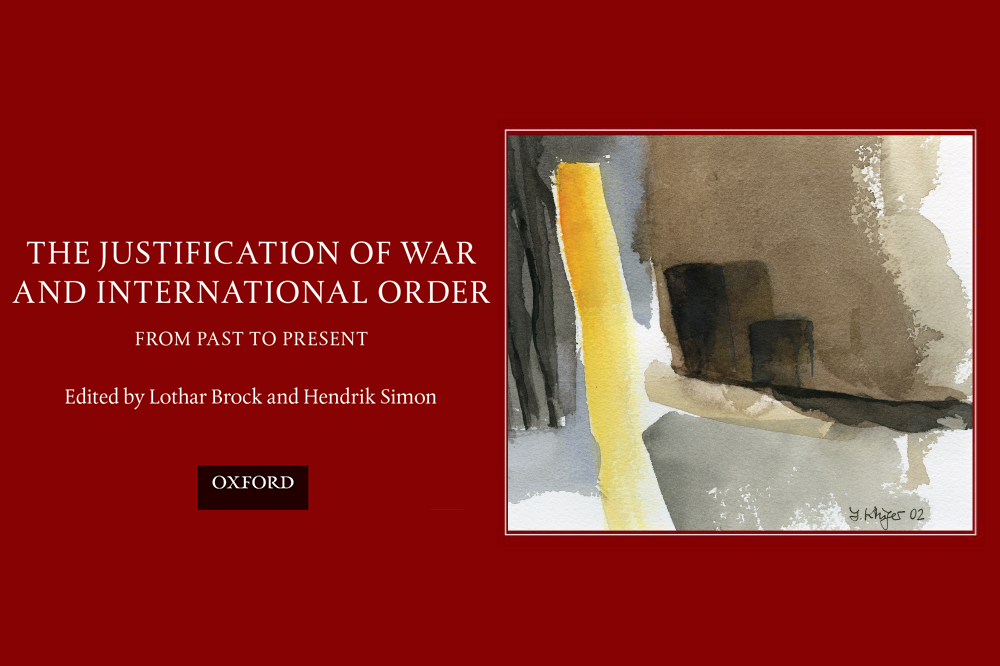War! What Is It Good For?
Introducing the Review Symposium on The Justification of War and International Order
‘The history of war is also a history of its justification’ (p. 3) – this is the momentous starting point of the volume on The Justification of War and International Order. From Past to Present, edited by Lothar Brock and Hendrik Simon and recently published by OUP in The History and Theory of International Law series. Several rather cynical interpretations of this starting point come to mind. In contrast, the editors set the optimistic tone of the volume by insisting that this history of justifications for war ‘entails a critique of war in general’. This, the editors argue, can be derived from the fact that there would be no need to justify something that is not deemed to be inherently problematic. The central thesis is that communicative practices justifying war and international order are co-constitutive (p. 4).
The book is composed of 26 chapters arranged into seven parts. Part I comprises two chapters, which introduce basic theoretical considerations underpinning the central concepts of the volume: war, order, and norms. Parts II through V each cover a period in time, starting with an ‘early modern’ period covering the fifteenth to eighteenth century (Part II), moving through the (long) nineteenth century (Part III), the period from the beginning of World War I to the foundation of the United Nations in 1945 (Part IV), and ending with the rise and decline of the ‘liberal peace’ after the Cold War (Part V). Parts VI and VII depart again from the chronological arrangement and present cross-cutting topics, namely Non-Western perspectives in Part VI and considerations of the international rule of law and patterns of justification and critique as the contribute to justifying, contesting, and perpetuating the use of force in Part VII.
As a frame to the individual contributions, Brock and Simon provide an introduction, which focuses on methodology, and a concluding chapter, in which they synthesize the contributions. The editors espouse a genealogical methodology in the sense that they highlight a dialectical relationship between continuity and change in how justifications of war and international order are co-constitutive (p. 13). As political agents refer to an existing norm to justify the use of force, they purport to be conforming to the ‘old’ order while simultaneously altering the norm to which they are referring and therefore creating a ‘new’ order.
The volume’s ethos is clearly rooted in a commitment to the Kantian project of ‘peace through law’ and in a rejection of ‘Realism’. The most important theoretical influences on the composition of the volume are Karl-Otto Apel’s discourse theoretical account of ‘communication communities’ (Kommunikationsgemeinschaften), Rainer Forst and Klaus Günther’s conceptualizations of normative orders, and other concepts developed within the framework of the normative orders cluster in Frankfurt am Main, including Miloš Vec’s concept of ‘multinormativity’. The volume’s approach to historical sources involving justifications of war was influenced in particular by Konrad Repgen, whose work Anuschka Tischer rediscovered and pushed further by evaluating his sources. In addition, the editors draw from an eclectic mixture of insights from historians, legal, political, and social theorists, including Michel Foucault, Walter Benjamin, Reinhart Koselleck, Rudolf von Jhering, and Hans Kelsen.
The contributions to the symposium engage with the volume under review from the point of view of varying disciplines and methodologies. Claire Vergerio and Wouter De Rycke both engage with the volume’s overall structure, argument, and methodology, while Parvathi Menon’s and Wouter Werner’s contributions reflect on more specific themes.
Claire Vergerio situates Brock and Simon’s main argument in the context of the literature on the history of international relations and focuses on how the volume speaks to other interventions on the role of norms in International Relations as a discipline more broadly.
Wouter De Rycke criticizes the book from the point of view of a historian, arguing that the book should have relied more heavily on instances of practice instead.
Parvathi Menon takes the volume under review as a starting point to reflect on the role of international law in justifying imperial domination and in delegitimizing emancipatory struggles involving the use of force.
Wouter Werner offers a glimpse at how the volume can shed a different light on familiar stories and on how the conversation involving the volume’s themes can carry on. He does so by connecting the book to the story surrounding the “Kony 2012” campaign.

Dr. Sué González Hauck is a postdoctoral researcher at Helmut Schmidt University, Hamburg and an editor at Völkerrechtsblog.

Sebastian M. Spitra is a Post-Doc Fellow at the Department for Legal and Constitutional History of the University of Vienna and a member of the Junge Akademie at the Academy of Sciences and Literature in Mainz. He is an editor at Völkerrechtsblog.

Nesa Zimmermann is a Senior Research Fellow at the University of Geneva and Co-director of the Law Clinic for the Rights of Vulnerable Persons. She holds a Ph.D. from the University of Geneva, a LL.M. from King’s College, London, and a MLaw from the University of Neuchâtel. Her fields of expertise include human rights law, migration law and constitutional law. Completed in 2020, her Ph.D. analyses particular aspects vulnerability-reasoning in the caselaw of the ECtHR. She is an editor at Völkerrechtsblog.
